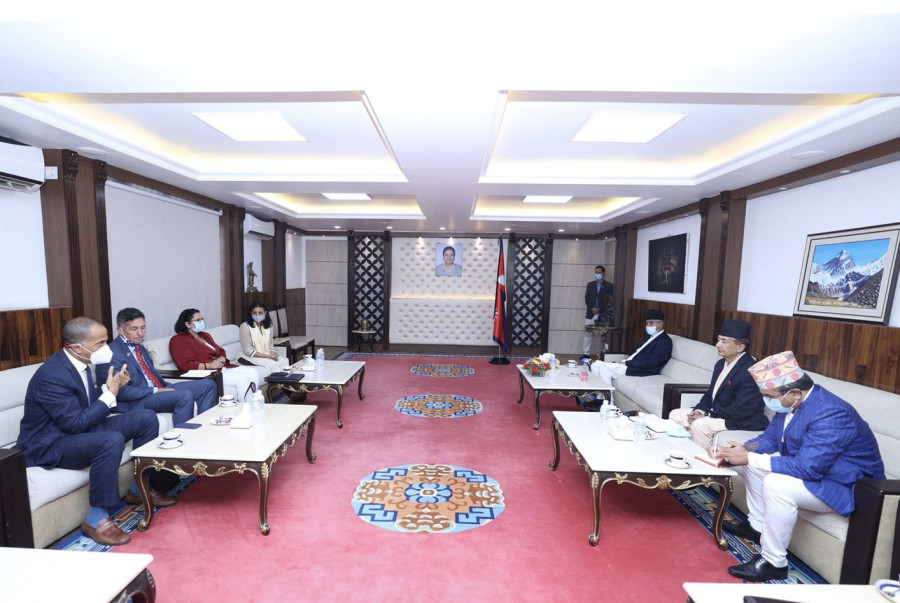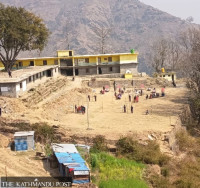National
Deuba tells US delegation he is hopeful of MCC ratification soon
Millennium Challenge Corporation officials continue meetings as the fate of the US programme hangs in the balance, with the Maoist Centre not making a clear position.
Anil Giri
Two top officials from the United States Department of Compact Operations continued their meetings on Friday, a day after their series of meetings with top political leadership in Kathmandu, starting with Communist Party of Nepal (Maoist Centre) chair Pushpa Kampl Dahal early Friday morning and Prime Minister Sher Bahadur Deuba later in the day.
Fatema Z Sumar and Jonathan Brooks, vice president and deputy vice president at the Millennium Challenge Corporation, arrived in Kathmandu on Thursday morning, in what seems to be their final bid to push the $500 million American grant for parliamentary ratification.
According to a statement issued by the Ministry of Finance, Prime Minister Deuba told the MCC delegation that he has continued his discussions at the political level to ratify the American programme.
Sumar said they expect that the MCC would be ratified by Nepal’s Parliament as soon as possible and she hoped that it would contribute to Nepal's development endeavours.
Sources close to Deuba said that during the meeting the prime minister told the US delegation he was trying to forge consensus among the ruling parties as well as with the opposition and that he was not for delaying the MCC’s ratification from the House.
The MCC delegation also met with the members of the Nepal-US Parliamentary Committee on Friday.
“Sumar briefed us on the status of the MCC and responded to our queries,” said Pushpa Bhusal, one of the members of committee. “We also discussed our concerns with her.”
The parliamentary committee consists of lawmakers from various parties.
“The MCC delegation tried to assuage the concerns raised by the parliamentarians. Since there is so much debate and controversy surrounding the US programme, we also discussed ways to address them,” said Bhusal, a lawmaker from the Nepali Congress.
Nepal signed up to the MCC in September 2017 after years of negotiations, but it has lately become a lightning rod for controversy, with political parties divided.
When the agreement was signed Deuba led the government backed by the Maoist Centre. Four years later, it’s once again Deuba at the helm with the support of the Maoist Centre. What, however, changed over the years is that the Maosit Centre became a fierce critic of the MCC.
Now Deuba appears firm on getting the MCC through Parliament, but his key coalition partner, the Maoist Centre, is yet to make a position.
During his meeting with Sumar and Brooks on Friday morning, Maoist Centre chair Dahal said that since a host of questions have been raised about the MCC, a national consensus is needed before his party makes a position.
“The US delegation told Dahal that they are not in Nepal to put any kind of pressure on the Nepali leadership,” Bishnu Sapkota, Dahal’s press coordinator, told the Post after the meeting between the Maoist chair and US officials.
“Our chairman told the US team that we will discuss the issue within the party and among the ruling alliance patterns so that a national consensus can be built on the MCC.”
On Thursday, KP Sharma Oli, the CPN-UML chair and former prime minister, told the MCC delegation that since his party is currently in opposition, he will make a clear position on the US programme only after the ruling alliance makes it.
The MCC Nepal Compact was registered in Parliament in July 2019 by then finance minister Yubaraj Khatiwada when Oli was the prime minister. When the UML was in power, Oli was all for the MCC’s parliamentary ratification. However, at that time Oli and Dahal were in the same party, the Nepal Communist Party (NCP), and the latter used the US programme against Oli.
On Thursday, Sumar and Brooks also met with CPN (Unified Socialist) chair Madhav Nepal and Janta Samajbadi Party leaders Baburam Bhattarai and Upendra Yadav.
While Nepal said his party won’t favour anything that is against national interest, Bhattarai had conveyed to the MCC delegation that a decision would be made on the basis of consensus among the parties.
Deuba either needs the UML’s support or that of all its coalition partners—the Maoist Centre, CPN (Unified Socialist) and the Janata Samajbadi Party—to get the MCC Nepal Compact through Parliament.
With parties, except the Nepali Congress, not making their position clear, it is unlikely the MCC would get ratified by Parliament from its ongoing session.
MCC officials, however, appear to be pretty clear and they seem to be in a mood to hammer home one point to Nepal’s political leadership—take it or leave it.
A day before the US officials arrived in Nepal, the MCC headquarters on Wednesday had dispatched its response to as many as 11 questions and supplementary concerns raised by Nepal. Finance Minister Janardan Sharma had on September 3 sent those questions and concerns to the MCC headquarters.
The response from the MCC headquarters in a nutshell was—Constitution of Nepal prevails over the MCC agreement, the MCC is not part of the Indo-Pacific Strategy, there is no connection between the MCC Nepal Compact and any military alliance or defence strategy and MCC Nepal Compact cannot be amended at this time.
That the MCC Nepal Compact cannot be “amended at this time” makes it pretty clear that the US this time is making one final push for its ratification.
Former and current diplomats told the Post on Thursday that the US delegation is in Nepal to send a message to the leadership in Kathmandu that if it is not ratified now, Washington would divert the aid to any other country.
Two projects have been identified in Nepal under the MCC—improvement of electricity transmission line and road infrastructure.
The US delegation on Friday afternoon also held talks with Energy Minister Pampha Bhusal.
“The MCC delegation is quite aware of the division created by the MCC in Nepal’s political and public spheres,” said a Congress leader. “But the MCC issue, we believe, will be settled very soon after an understanding among the ruling parties and the opposition.”




 27.41°C Kathmandu
27.41°C Kathmandu














